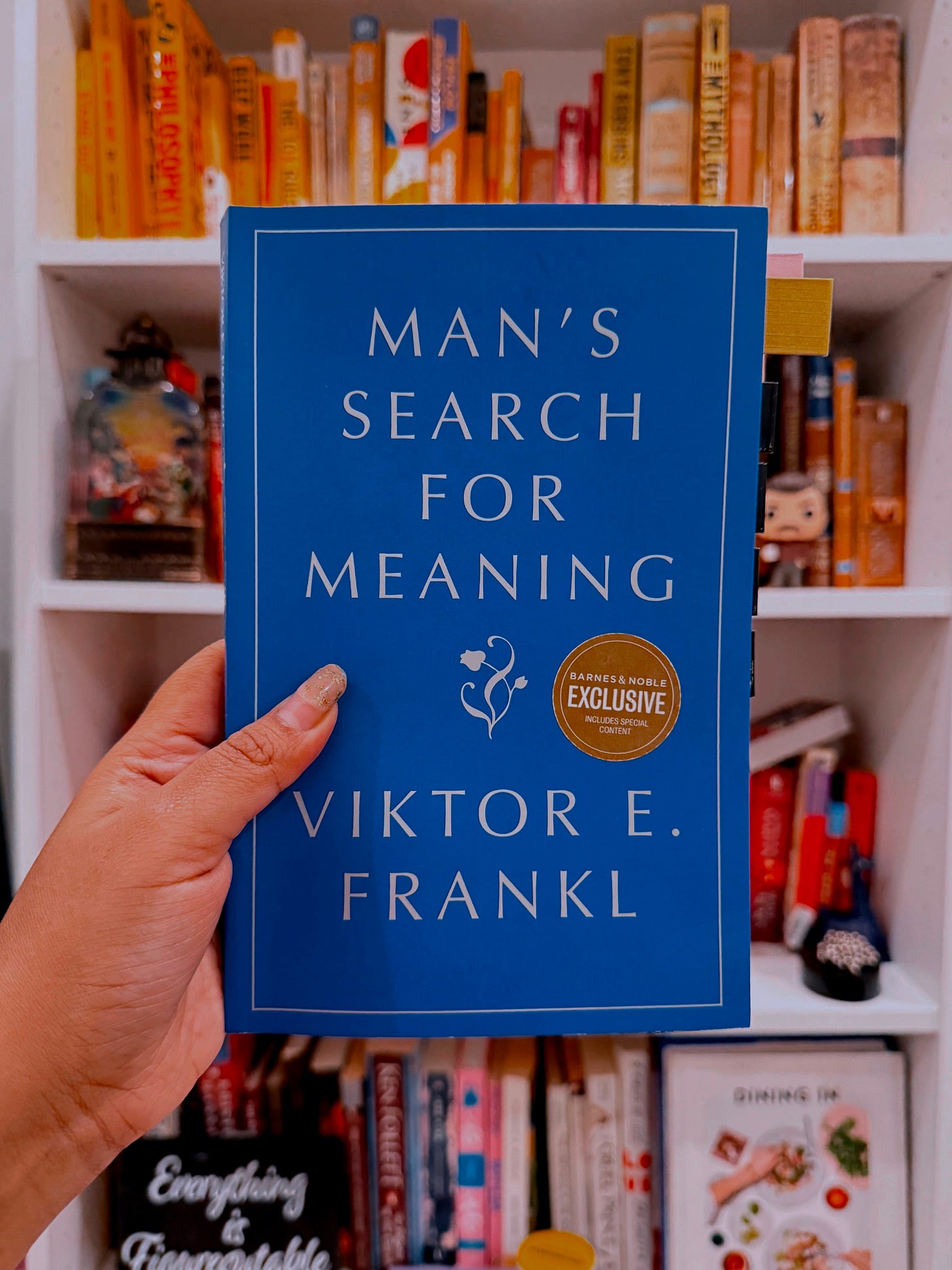how to end suffering
weekly slow essay card 1: Suffering is inevitable but can end. Here’s how the author of Man's Search for Meaning shows us this truth.
There is only one way to end suffering, and that is by giving it meaning. Remember, there is no other way. Victor Frankl writes in Man’s Search for Meaning, echoing Spinoza’s Ethics:
“Emotion, which is suffering, ceases to be suffering as soon as we form a clear and precise picture of it.”
“If there is meaning in life at all,” Frankl said, “there must be meaning in suffering.”
“Suffering is an ineradicable part of life — like death and fate. Without it, life is not complete.”
If you have a why, a purpose, a reason — suffering, not under any circumstances, is suffering any longer.
In the deepest substrate of us, this holds true: Without meaning, suffering becomes anguish. With it, strength.
How do you impart meaning to suffering?
In the early mornings at Auschwitz, prisoners plodded through darkness to their worksites — stumbling under blows and frozen to the bone. Each man thought of his wife. Among them was Victor Frankl. Frankl’s mind clung to his wife Tilly’s image, and he began speaking to her. Her presence felt so astonishing and vivid, that he began to realize this sacred truth:
“…[A] man who has nothing left in this world still may know bliss, be it only for a brief moment, in the contemplation of his beloved… [l]ove is the ultimate and the highest goal to which man can aspire.”
Had he known at the time that his wife had already died at another camp, Frankl said the formidable love that made his suffering bearable, would have sustained and fulfilled him all the same.
Before his arrest, Frankl — a physician and psychiatrist — had drafted a manuscript outlining his therapy. The Gestapo, in their philistine vigor, destroyed it. In the Nazi camp, Frankl resolved to survive as his chance to recreate it — to make his life’s work real. That book became Man’s Search for Meaning. His catalytic theory — logotherapy — challenging modern psychotherapeutic notions of his time — has helped millions.
He who has a ‘why’ can bear any ‘how’
In 1918, Winston and Clementine Churchill lost their two-year-old daughter, Marigold, to septicemia. Friends recalled Winston undone — weeping openly. Rarely speaking of “Duckalilly” afterward, Churchill’s loss deepened the undertow of melancholy that had haunted him since youth. His “black dog” — as he called his depression — stole upon him without warning, cloaking him in such lethargy and despair that even the precipices of balconies and train platforms seemed menacing. In fact, as Erik Larson writes in The Splendid and the Vile:
“In less than twenty weeks… Churchill had lost his mother, daughter, brother-in-law, and faithful manservant.”
Out of that abyss, Churchill spoke: “We shall draw from the heart of suffering itself the means of inspiration and survival.” Bearing his child’s absence like armor, he rose, stood at the helm, warned the world of the terror to come from Nazi Germany before anybody else did, and rallied a nation against them. Beyond the battlefield, he was a gifted painter; and in time, the world also honored him with the Nobel Prize in Literature.
As Frankl observed:
“The way in which a man accepts his fate and all the suffering it entails… decides whether he is worthy of his sufferings or not.”
In the 1960s Bangladesh, my grandparents lost a healthy teenage son and daughter — in one day — to a disease curable now by a simple salted beverage. Later, their mother, widowed at only 30, raised four children alone through a genocidal war. The eldest daughter, my mother, scarcely 21, was an associate professor of medicine, her work with UNICEF, WHO, and Johns Hopkins saving countless children from the same disease that had taken her siblings. Her award-winning research is still cited in the Journal of Pediatrics.
My aunt, a precocious lawyer, rose to the bench as a Supreme Court judge in her youth. My uncle pursued music with a voice that carried both joy and pain. And the youngest became an architect of modern tech in Australia.
Each fulfilled their father’s dreams.
Amid the chaos of war, with every comfort stripped away — out of rubble and grief, they built lives of purpose.
Anton Chekhov — diagnosed with tuberculosis as a young man — lived and wrote through pain for the whole of his brief life, telling no one of his condition. After his brother succumbed to the same disease, Chekhov sought a harsher purpose and journeyed across Siberia to a prison island north of Japan. There, he interviewed a thousand inmates, exposing the state’s inhumane treatments of convicts. His Sakhalin Island remains one of the most important works of Russian social science — later seen in Murakami’s 1Q84.
Chekhov continued to write some of his most famous stories through waning physical health — confirming his place as one of Russia’s most beloved writers — second only to Tolstoy. He died at 44. “Only Shakespeare outranks [him] in terms of… adaptations of their work,” remarked editor Alan Twigg.
It is undeniable that Chekhov suffered — but his life cannot be called unfulfilled.
We suffer more often in imagination than in reality
We endure suffering in a thousand disguises. Therapy can ease it; numbing can hide it. Work, substances, disavowal, diversions — common masks for pain. But as the Buddha warns in the Dhammapada, most human remedies often compound suffering instead of relieving it.
Seneca put it this way:
“We suffer more often in imagination than in reality.”
Frankl saw it firsthand: many inmates died around Christmas — their hearts giving out when the reunion with family never came. They had hoped they’d be home by the holidays. When hope curdled into despair, the despair killed them. One prisoner dreamed he would be free on March 31. When the day came and freedom did not, he died on April 1. His body gave out the moment his hope did. Six months later, in September 1944, the International Red Cross trucks finally arrived.
Let hardship carve out meaning
How you make sense of your suffering, carry it, and keep going — can tell you what story you’re writing about yourself and what you believe about life. It can also determine your character — as depicted by Frankl’s observations of the various different ways inmates dealt with anguish — some inflicting pain upon others, others showing extraordinary kindness.
Robert F. Kennedy, mourning his brother, said:
“Tragedy is a tool for the living to gain wisdom, not a guide by which to live.”
Abandoning your inner self under the weight of suffering is not a challenging endeavor. To be petty, harsh, vengeful, dishonorable — are easy reflexes. The other way is rare and poses the real difficulty: showing compassion while you’re carrying your own pain. Laboring in service of something beyond yourself, wielding your voice — even while you’re staggering under your own suffering. Doing something for someone that no one else will. Leading when it’s safe to follow. To stand where neutrality will not stand. Extending empathy when it costs you something. These are the real tests of character. Frankl concedes, “very few possess [it].” What if your pain could sharpen your empathy, strengthen your character, and enlarge your world rather than contract you?
Aim for a life fulfilled, not pain-free. One day, someone will remember your story, become stronger for it, long after you’ve forgotten the pain. Perhaps that is the truest immortality.
“He who has a why can bear any how.” - Nietzsche
This piece is mine, written by hand, not AI.
How have you given meaning to your suffering? I may feature responses in a future essay. Here is my contact info.
Ways to carry it:
Philosophy is easier said than done. Some ways to start slow:
Name the suffering, then name the reason. Train yourself to notice suffering instead of numbing it. (“This pain is unbearable. But it forces me to slow down.”)
Turn frustration into creation. A sketch, poem, voice note — transform anguish into artifact.
Help someone else avoid the suffering you endured. The highest form of meaning-making.
On the shelf:
Here are the books I mentioned with links to recommended editions:
Man’s Search for Meaning by Viktor Frankl — Dear Jane Bookshop | Amazon
The Splendid and the Vile by Erik Larson — Dear Jane Bookshop | Amazon
Churchill: Walking with Destiny by Andrew Roberts — Dear Jane Bookshop | Amazon
The Dhammapada trans. Eknath Easwaran — Dear Jane Bookshop | Amazon
Proceeds from purchases through Dear Jane Books help support independent bookstores. Proceeds from the Amazon Affiliate Shop (shared for those seeking quicker delivery) contribute to the editorial upkeep of The Slow Philosophy.
We’ll return to Man’s Search for Meaning in future essays.








Meaning gives pain its shape. Without it, suffering is chaos; with it, it becomes direction. Frankl understood what most of us avoid, that purpose isn’t found in comfort, but in how we carry what we didn’t choose. We live in a time that treats discomfort like a disease, yet every person I’ve ever met who found peace did so through struggle, not escape. Maybe the question isn’t how to end our suffering, but how to let it refine us.
What has pain taught you that comfort never could?